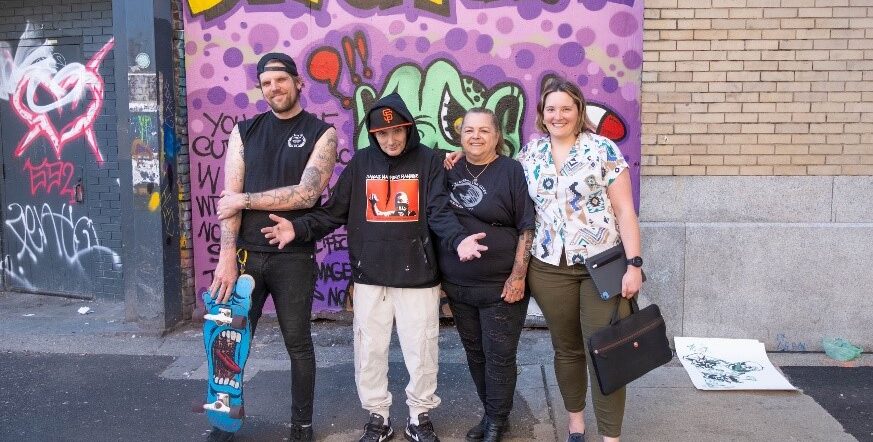Pictured here are some of the team members including Dr Sofia Bartlett, the Interim Scientific Director of Clinical Prevention Services at the BC Centre for Disease Control, Pam Young from Unlocking the Gates which is a peer support organization for people who are being released from custody in the BC Provincial Corrections, and Trey Helten and Smokey-Devil, local graffiti artists (Smokey D is a self-identified underworld street reporter, currently receiving care for hepatitis thanks to this program).
What better way to commemorate World Hepatitis Day on July 28 and honour the 1.3M people who die from Hepatitis globally every year, then to highlight an innovative, equity-based program we have been supporting since the idea was borne, and why we are so compelled to continue making this impact?
Test, Link, Call was created by Dr Sofia Bartlett, the Interim Scientific Director Clinical, Prevention Services at the BCCDC. This initiative helps people with hepatitis B and C and HIV who experience criminalization, such as people who use unregulated drugs, or who are unstably housed, or who experience incarceration, receive treatment by providing them with a cell phone and six months of service to access healthcare and social support.
The program, which was introduced in 2021 to treat hepatitis C and has since expanded, became an immediate success. According to Dr Bartlett, 81% of participants in the program started curative treatment, which is twice higher than what is usually achieved in this population.
What is perhaps more remarkable however, is how this program changes lives beyond just care and treatment. It provides people with hope, dignity, and compassion and demonstrates how important human, people-centred public health can be for equity-deserving populations who encounter barriers when accessing the care they need. Meeting people where they are at, Dr Bartlett routinely works in the community to deliver in-person support and this one story of her experience with just one person who was helped by this initiative, demonstrates the invaluable impact of Test, Link, Call and public health programs that focus on equity, compassion, and a belief in the life-changing outcome of a simple idea.
A new connection leads to life-changing support
Dr Bartlett was helping with outreach at the Maple Ridge Community Hub, where people transitioning from correctional facilities back to the community were coming together to receive support. She was there to provide cell phones for participants already enrolled in Test, Link, Call, but stayed to meet with other folks who were looking for information. A chance encounter with someone visiting the Hub showed her just how important this project had become. Dr Bartlett shared this story with Foundation staff:
“A young man I was chatting to shared with me that he was interested in finding out about hepatitis C treatment. We started chatting about Test Link Call and he decided he wanted to enroll in the program. We had an extra phone on hand, so went ahead with setting that up for him after he filled in the forms.
I was sitting beside him in the parking lot on a plastic chair, going through the apps on the phone, when I noticed he had tears in his eyes. I asked if he was OK, and he replied: “Yeah I’m way better than OK, this is the nicest anyone has been to me for a long time. I’m just feeling a bit overwhelmed, you know?”
I teared up as well! It was just 15 minutes of my time, but it was a huge help for this young man. He was connected to a hepatitis C treatment provider, as well as given referrals to Opioid Agonist Therapy as he was planning to cut back on substance use and wanted help to do that.
He was able to finish his hepatitis C treatment a few months later and is doing much better now that he is in supportive housing. This one client really showed me the power of ‘meeting people where they are at’ and how much of a difference something simple like a cell phone can make.” – Dr. Sofia Bartlett
Public health as a cost savings
This young man was dealing with a life-threatening virus, with a complex set of intersecting circumstances, but did not have the resources to seek treatment. Test, Link, Call gave him access to a cure and connected him with peer mentors who were able to help with referrals to further treatment and housing, all at a cost savings to our healthcare system.
By testing and treating people before they require hospitalization for liver-related conditions — including liver transplants and liver cancer, Dr Bartlett estimates a savings to our healthcare system of $5,961 per participant, compared to the program cost of less than $1,000 per person. This is a great example of a public health initiative that is focused on disease prevention, addressing social determinants of health, and upstream action for equity-deserving populations.
Taking steps to achieve Canada’s goal
Canada shares the World Health Organization’s goal of eliminating hepatitis as a public health threat by 2030. This is a daunting task, as hepatitis is now the world’s deadliest virus, after COVID-19. Although difficult, this goal can be achieved by working together to support projects like Test, Link, Call. With help from donors like you, we can address some of the biggest challenges to disease elimination, which include continued stigma and inequitable access to care, which prevents at risk populations from receiving crucial screening and treatment.
Test, Link, Call is a shining example of the kind of compassionate engagement our Foundation supports. Partners in this project, including the BCCDC, BC Mental Health and Substance Use Services, BC Hepatitis Network, and Unlocking the Gates Services Society, as well as our donors, continue to help us as we implement programs and projects grounded in the most pressing public health priorities for British Columbia. Together, we are creating a healthier, safer, and more equitable future for all.



